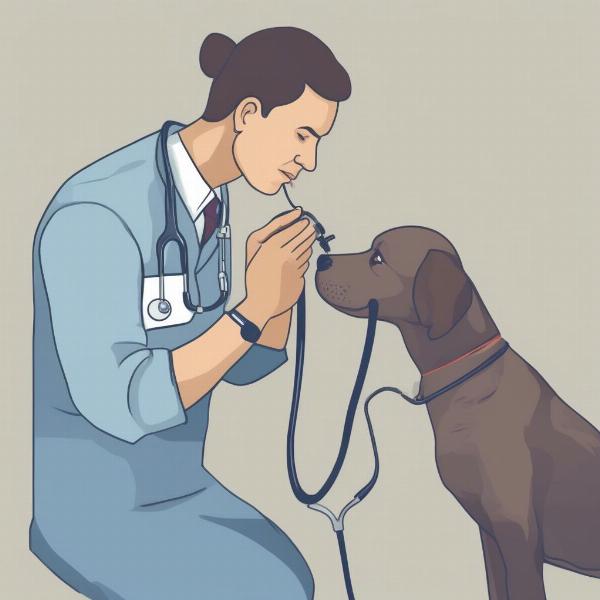If your dog makes a honking noise, it’s likely they’re experiencing a cough rather than actually honking like a goose. This can be alarming, but understanding the potential causes can help you determine the next steps for your furry friend’s care. This article will delve into the reasons behind a dog’s honking cough, covering everything from common ailments like kennel cough to more serious conditions. We’ll also explore diagnosis, treatment options, and preventative measures you can take to protect your canine companion.
A dog’s honking cough is often a symptom of tracheal irritation or inflammation. While it can sometimes be a minor issue, it’s crucial to pay attention to its severity and any accompanying symptoms. A persistent or worsening cough can indicate a more serious underlying problem requiring veterinary attention.
Common Causes of a Honking Cough in Dogs
Several common conditions can cause a dog to develop a honking cough. Recognizing these potential causes is the first step towards effective management and treatment.
Kennel Cough
Kennel cough, also known as canine infectious tracheobronchitis, is a highly contagious respiratory infection often characterized by a dry, hacking cough that can sound like a honk. It’s easily spread between dogs in close quarters, such as kennels, dog parks, and training classes.
Tracheal Collapse
This condition primarily affects small breed dogs and involves the weakening and flattening of the trachea, leading to breathing difficulties and a distinctive honking cough. Obesity, excitement, and pulling on the leash can exacerbate the cough.
Heart Disease
In some cases, a honking cough, especially in older dogs, can be a symptom of heart disease. Fluid buildup in the lungs due to heart failure can irritate the airways, resulting in a persistent cough.
Allergies and Irritants
Just like humans, dogs can suffer from allergies to environmental factors like pollen, dust, and mold. These allergens can irritate the airways and trigger a cough, which might sound like honking. Exposure to irritants like smoke and strong cleaning chemicals can also cause a similar reaction.
Diagnosing the Honking Cough
If your dog develops a honking cough, it’s essential to consult a veterinarian for a proper diagnosis. The vet will perform a physical examination, listen to your dog’s lungs, and may recommend further tests like blood work, chest X-rays, or a tracheal wash to determine the underlying cause.
Treatment Options
Treatment for a honking cough depends on the underlying cause. Kennel cough is often treated with antibiotics, cough suppressants, and rest. Tracheal collapse management might involve medication, weight management, and the use of a harness instead of a collar. Heart disease requires specific medications and lifestyle adjustments. Allergies are typically managed with antihistamines or other allergy medications.
 Veterinarian Examining Dog with Honking Cough
Veterinarian Examining Dog with Honking Cough
Preventing a Honking Cough
While not all causes of a honking cough are preventable, certain measures can help reduce the risk. Keeping your dog’s vaccinations up-to-date, including the kennel cough vaccine, is crucial. Avoiding exposure to known irritants and managing allergies can also help prevent coughing episodes. For small breeds prone to tracheal collapse, using a harness and maintaining a healthy weight are essential preventative steps.
Is a Honking Cough Always Serious?
While a honking cough can sometimes be a minor issue, it’s crucial to consult a veterinarian to rule out any underlying medical conditions, especially if the cough is persistent, worsens, or is accompanied by other symptoms.
What Can I Do at Home to Help My Dog?
Ensuring your dog has plenty of fresh water, rest, and a comfortable environment can help alleviate their discomfort. Using a humidifier can also help soothe irritated airways. However, it’s crucial to avoid giving human medications to your dog without veterinary guidance.
Conclusion
A dog making a honking noise signals a cough that should not be ignored. While it can be caused by relatively minor ailments like kennel cough or allergies, it can also indicate more serious conditions like tracheal collapse or heart disease. Prompt veterinary diagnosis and appropriate treatment are essential for your dog’s well-being. By understanding the potential causes, treatments, and preventative measures, you can take proactive steps to ensure your canine companion’s respiratory health.
FAQs
-
How long does a kennel cough usually last? Kennel cough typically resolves within 1-3 weeks, although some cases can persist for longer.
-
Is tracheal collapse curable? Tracheal collapse is not curable, but it can be managed effectively with medication, lifestyle adjustments, and in some cases, surgery.
-
Can my dog get kennel cough even if they are vaccinated? While vaccination significantly reduces the risk, it’s not 100% effective, and vaccinated dogs can still develop mild cases of kennel cough.
-
What are the signs of a collapsing trachea in dogs? Common signs include a honking cough, difficulty breathing, exercise intolerance, and bluish gums.
-
When should I take my dog to the vet for a honking cough? If the cough persists for more than a few days, worsens, or is accompanied by other symptoms like lethargy, loss of appetite, or difficulty breathing, seek immediate veterinary attention.
-
Can I give my dog cough medicine for humans? Never give your dog human medications without consulting a veterinarian. Some human medications can be toxic to dogs.
-
How can I prevent my dog from getting kennel cough? Vaccination, avoiding overcrowded dog areas, and maintaining good hygiene can help reduce the risk of kennel cough.
About ILM Dog:
ILM Dog is your trusted international resource for comprehensive dog care and breed information. From puppy care to senior dog health, we offer expert advice on dog breeds, health, training, nutrition, and grooming. We’re dedicated to helping you provide the best possible care for your furry friend. For expert guidance tailored to your dog’s specific needs, contact us via email at [email protected] or call us at +44 20-3965-8624.